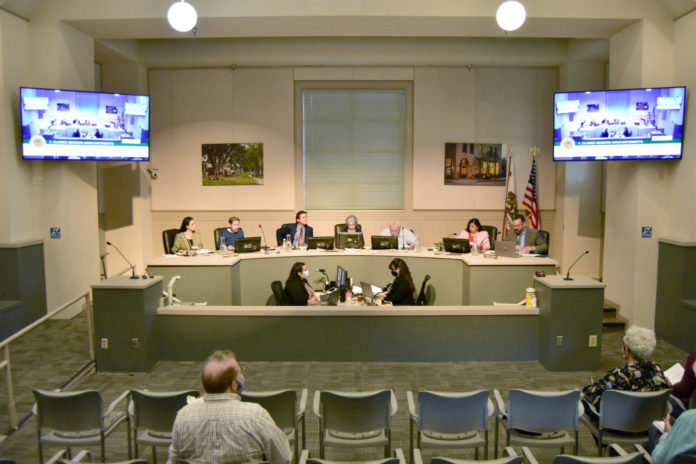Bravo.
Recognizing many stakeholders wanted to provide public comment on a closed session agenda item (the Caltrans property litigation), the South Pasadena City Council this week did something different. Instead of holding the public comment portion of its closed session in the city manager’s cozy but cramped upstairs city hall conference room, it held the session in the formal downstairs city council chamber. The chamber, unlike the conference room, is designed for formal public meetings, complete with audience seating, speaker podiums, audio-visual recording capability, and a city clerk taking minutes.
While the council deserves praise for taking this step, it should be the rule, not the exception.
In recent weeks, dozens of people spoke to the council prior to closed sessions, but there is no published record of who they were or what they said. Nor has there ever been.
South Pasadena’s practice of having two public comment venues–one in the conference room before closed session and another in the council chamber ahead of the public agenda, is weird. “This is a unique situation I have not heard of before,” said Brittney Barsotti, general counsel at the California Newspaper Publishers Association. “My interpretation of these facts is that this is a second public comment period that should fall under the open session rules of the Brown Act.”
The City’s practice creates a divide between insiders, who know of the unique opportunity to address councilmembers in a more intimate, informal and personal setting, and those relegated to the comparatively antiseptic public comment period in the council chamber. That’s because while the ability to make public comment is noted on closed session agenda, most citizens don’t know about it. They quite reasonably think if they want to offer public comment, they should attend a meeting in the council chamber.
In addition, unlike comment periods during public sessions, council minutes never reflect whether public comments were made during pre-closed session comment periods–let alone what was said or by whom. Moreover, since conference room sessions aren’t taped, there is no record at all of any public comment.
Equally egregious is that historically, when citizens sought to document pre-closed meeting public comment using a smartphone, they were discouraged from doing so. Even this week, Deputy City Manager Domenica Megerdichian said if citizens wish to record closed session public comment, city officials “should be notified that they are doing so.”
These practices, besides violating the City Clerk’s mission statement “to provide equal access to open and transparent government,” are anti-democratic and should be abolished. The relevant section of the Brown Act, Government Code 54953.5(a), could not be more clear. Absent a “reasonable finding” that doing so would disrupt the proceeding, “Any person attending an open and public meeting of a legislative body of a local agency shall have the right to record the proceedings with an audio or video recorder.”
The city should not use the fig leaf of a separate closed session venue to suppress the making of a public record.
Not memorializing pre-closed session public comment also goes against reasonable adherence to accepted practice for professional minute taking, which is among the duties of the city clerk under both state and municipal code. City clerks have considerable discretion over what to record. They may take “action” minutes recording only final council actions, or “brief summary” minutes that may include all meaningful comment a legislative body receives to make policy decisions. But once an approach is selected, it should be consistent.
South Pasadena minutes for public sessions historically take the brief summary approach. The City Clerk Association of California provides relevant guidance for memorializing public comment regardless where or when it is offered: “brief summary minutes shall, at a minimum, list the public member’s name (if provided); and at a maximum, include the overall topic and stand/position” taken. Although the city council hasn’t published minutes for any of its closed or open meetings since March, the minutes it has published–albeit only for open sessions–have tilted toward the “maximum” level of reportage, even as they omit reporting whether public comment was offered prior to a closed session.
The council and city manager should ensure duties for Desiree Jimenez, the recently appointed Chief City Clerk, include timely reporting of minutes for all city council public comment opportunities, including those prior to closed sessions. They should abandon partial constraints on citizens recording public comment. Finally, they should arrange for permanent taping of all public comment opportunities, even if it means all future closed sessions must be in the council chamber.















.png)







